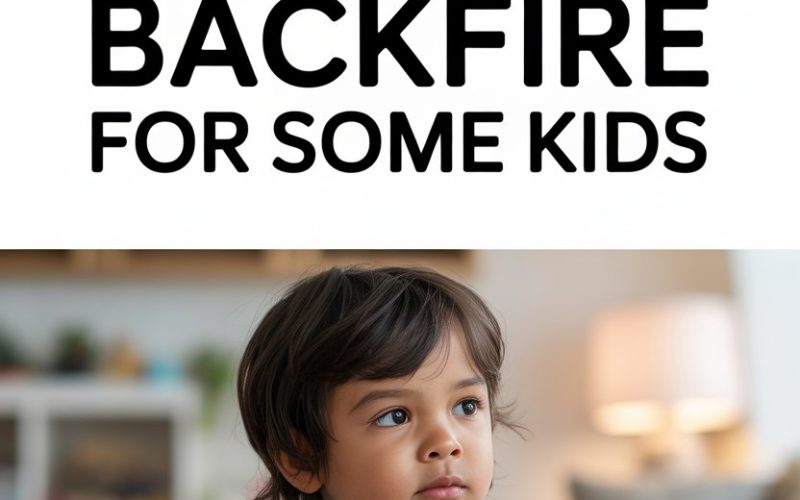Every parent has been there.
You’re dangling the promise of chocolate buttons, extra screen time, or a shiny sticker, hoping for a miracle—just put on your shoes, finish your peas, or please, for the love of all that’s holy, brush your teeth.
Sometimes it works. Other times, you’re left baffled as your child shrugs off your offer and continues fashioning a spaceship out of the recycling bin.
Why do rewards work magic for some kids, but seem to fizzle spectacularly for others?
It’s not you. It’s not them. Well—maybe it’s a bit of both.
Let’s untangle the mystery of why rewards backfire for some children, and what you can try instead, right after you fish that jam sandwich out of the VCR.
Why Some Kids Treat Rewards Like Expired Coupons
Rewards are supposed to light a fire under kids, right? Promise a trip to the park and suddenly socks are on feet, the milk isn’t being spilt, and the dog’s tail remains unpulled.
For plenty of families, this “carrot” approach is a trusty tool—at least, until it isn’t.
Plenty of children see through the sticker chart with a look that says, “You want me to pick up my toys for a holographic unicorn? Please.”
There are a few big reasons the old reward system sometimes falls flat:
The Motivation Muddle
Rewards can accidentally send a mixed message.
When kids are rewarded for doing things they’d otherwise do naturally—say, reading a book or helping a sibling—they start to wonder: “Am I doing this because I want to, or just for the goodies?”
Psychologists call this the overjustification effect. When an external reward is given for something a child already enjoys (like drawing or sharing), their own interest can dry up.
Suddenly, art isn’t just for fun, it’s for earning ice cream. And when the rewards stop, so does the motivation.
Some Kids Are Born Negotiators
You might have a child who treats reward offers like a business deal at the United Nations. “How many stickers for making my bed?” “What about if I brush the cat, too?”
It’s not that they’re greedy—they’re smart. They’ve learned to hold out for a better offer.
Research suggests that children who are more independent or strong-willed may be less influenced by rewards. They prefer to feel in charge, rather than being nudged along by external promises.
These kids are often the ones who resist sticker charts with a passion usually reserved for broccoli.
The Pressure Cooker Effect
Even well-meaning rewards can dial up the pressure. Some kids feel so much anxiety about earning the reward (or not losing it) that they freeze up or give up.
A child who worries about disappointing you might decide it’s safer to not try at all, rather than risk failing and missing out on that trip to the zoo.
Kids Who Crave Connection, Not Carrots
For a lot of children, particularly those who are sensitive or have experienced stress or trauma, rewards can feel transactional. T
hey’d rather have your attention, your company, your delight in their efforts—than another trinket or treat. To them, a gold star is just a sticker; your genuine praise is worth its weight in, well, love.
When Rewards Turn Ordinary Tasks Into Chores
Ever noticed how a child who loves setting the table suddenly loses all interest when you start offering a reward?
Tasks that were once fun or routine can morph into “work” as soon as there’s payment attached. Suddenly, no one wants to tidy up unless there are jellybeans at stake.
What Actually Works Instead?
If rewards are sputtering, it’s time to think sideways. There’s no single magic bullet (and anyone who says otherwise probably wants to sell you a sticker chart app).
Here’s what research and seasoned parents suggest can help:
Focus on the Feeling, Not the Prize
Rather than bribing your child to read, try sharing in the experience. Curl up together with a silly book, laugh at the pictures, use funny voices. The real reward is your snuggles and attention.
Countless studies show that kids are more likely to stick with a behaviour when it’s tied to positive connection—and not a bit of sugar at the end.
Catch Them Being Great—And Tell Them Why
Children thrive on feedback that’s specific and genuine. Instead of tossing out a generic “Good job!” try, “I saw how you helped your sister with her shoes. That was really kind.”
This approach, called process praise, encourages positive behaviour for its own sake. It helps kids notice what they did well, so they can repeat it (and bask in your approval).
Let Them Own It
Hand over the reins—where you can. Invite your child to set their own goals or choose how to solve a problem. This sense of ownership can be more motivating than the promise of a reward.
Kids love being decision-makers. “Would you rather tidy up before or after dinner?” gives them control, often leading to more cooperation (and fewer double-crossed arms).
Problem-Solve Together
When a child refuses to budge even for the best bribes, try a collaborative approach. Sit down and ask, “I notice getting ready for school has been hard. What do you think would help?”
This simple shift from power struggle to partnership works wonders, especially for children who resist rewards because they value autonomy.
Make It Playful
Turn the task into a game. Race to see who can get pyjamas on the fastest, sing a silly cleaning-up song, turn toothbrushing into a dinosaur-stomping adventure.
Play, unlike rewards, is its own motivation.
If your child is the sort who can’t be swayed by the promise of a biscuit, a bit of fun might just get you both to the finish line—giggles included.
When Rewards Still Have a Place
It’s not time to toss every sticker chart in the recycling bin. Some children respond beautifully to structured incentives, especially for tasks that are tough or unfamiliar (looking at you, potty training).
The trick is to use rewards as an occasional boost, not a daily expectation. Keep the focus on effort, progress, and connection—rather than the “what do I get?” at the end.
And when all else fails, there’s always the universal motivator: “If you’re ready in five minutes, we’ll have time to stop for a babyccino.” (It works almost as well on grown-ups.)
Spotting When Rewards Are Backfiring
If you’re not sure whether your reward system is helping or hindering, look for these telltale signs:
- Your child loses interest in activities they once enjoyed, unless there’s a prize involved.
- You find yourself constantly raising the stakes: “No, not one sweet—three!”
- Bribery turns into a daily negotiation, and you’re losing. Badly.
- Meltdowns erupt when rewards are missed or withheld.
- Your child seems more motivated to please you, or themselves, than to win a sticker.
If any of these sound familiar, it’s a sign your child might need a different approach—or at least a break from the carrot and stick routine.
What About Kids With Additional Needs?
For neurodiverse children—those with ADHD, autism, or sensory differences—rewards can be a mixed bag.
Some find structure and predictability soothing. Others find sticker charts confusing, pointless, or even overwhelming.
A flexible approach is key. You know your child best. What motivates one child might be a total flop for another.
If you’re unsure, a quick chat with your child’s key worker, teacher, or paediatrician can offer fresh ideas that are tailored to your family.
The Perils of Over-Praising
It’s easy to swing from one extreme to the other: if rewards are risky, should you just praise every tiny good deed? The truth is, too much empty praise can be just as unhelpful.
When kids hear “You’re amazing!” for every scribble, they stop believing it—and may even feel pressure to live up to the hype.
Instead, try to notice effort, progress, and kindness. “You really stuck with that puzzle, even when it got tricky,” means more than a stack of gold stars.
What If Nothing Seems to Work?
Some days, it all goes pear-shaped. No reward, praise, or plea makes a dent.
This happens to everyone (even the parenting ‘experts’ whose own kids have been known to eat biscuits for breakfast while wearing shoes on their hands).
On those days, the best thing you can do is take a deep breath, lower the bar, and remember: your relationship with your child is more important than any sticker chart.
Every parent has difficult days.
If you’re feeling stuck, reach out to other parents, your health visitor, or a trusted professional. Sometimes just talking it out brings relief—and maybe a new idea to try tomorrow.
Why Some Kids Need More
Every child is unique.
Some will jump through hoops for a pack of Pokémon cards. Others just want your attention, a cuddle, or a high-five. Some need time, understanding, and lots of chances to get it right.
Raising kids is an experiment without a control group. What flops today might fly next week.
The key is to keep your sense of humour, stay curious, and remember: rewards are just one tool in a very large parenting toolkit.
The Sweetest Reward
When it comes to coaxing kids through the trickier parts of family life, rewards have their place—but they’re far from the whole story.
Many children crave connection, autonomy, and the satisfaction of doing something well (or at least, doing it their way).
If sticker charts have lost their shine, try a sprinkle of praise, a dollop of play, and a big helping of parental patience.
You might just find that the sweetest reward isn’t a shiny sticker, but a happy, connected child—jam sandwiches and all.




